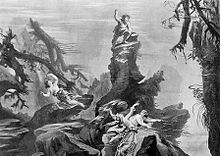Ring of the Nibelung
| Der Ring des Nibelungen | |
|---|---|
| Music dramas by Richard Wagner | |

|
|
| Librettist | Richard Wagner |
| Language | German |
| Premiere |
Bayreuth Festspielhaus |
Der Ring des Nibelungen (The Ring of the Nibelung), WWV 86, is a cycle of four German-language epic music dramas composed by Richard Wagner. The works are based loosely on characters from the Norse sagas and the Nibelungenlied. The composer termed the cycle a "Bühnenfestspiel" (stage festival play), structured in three days preceded by a ("preliminary evening"). It is often referred to as the Ring Cycle, Wagner's Ring, or simply The Ring.
Wagner wrote the libretto and music over the course of about twenty-six years, from 1848 to 1874. The four parts that constitute the Ring cycle are, in sequence:
Although individual works of the sequence have occasionally been performed separately, Wagner intended them to be performed in series. The first performance as a cycle opened the first Bayreuth Festival in 1876, beginning with Das Rheingold on 13 August and ending with Götterdämmerung on 17 August.
Wagner's title is most literally rendered in English as The Ring of the Nibelung. The Nibelung of the title is the dwarf Alberich, and the ring in question is the one he fashions from the Rhine Gold. The title therefore denotes "Alberich's Ring". The "-en" suffix in "Nibelungen" can occur in a genitive singular, accusative singular, dative singular, or a plural in any case (in weak masculine German nouns), but the article "des" immediately preceding makes it clear that the genitive singular is intended here. "Nibelungen" is occasionally mistaken as a plural, but the Ring of the Nibelungs (in German Der Ring der Nibelungen) is incorrect.
The cycle is a work of extraordinary scale. Perhaps the most outstanding facet of the monumental work is its sheer length: a full performance of the cycle takes place over four nights at the opera, with a total playing time of about 15 hours, depending on the conductor's pacing. The first and shortest work, Das Rheingold, typically lasts two and a half hours, while the final and longest, Götterdämmerung, takes up to five hours, excluding intervals. The cycle is modelled after ancient Greek dramas that were presented as three tragedies and one satyr play. The Ring proper begins with Die Walküre and ends with Götterdämmerung, with Rheingold as a prelude. Wagner called Das Rheingold a Vorabend or "Preliminary Evening", and Die Walküre, Siegfried and Götterdämmerung were subtitled First Day, Second Day and Third Day, respectively, of the trilogy proper.
...
Wikipedia
